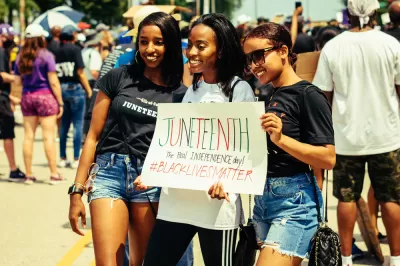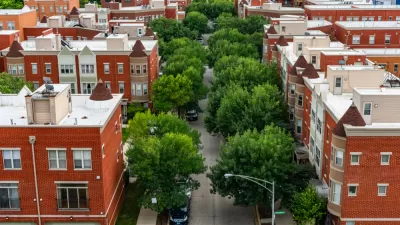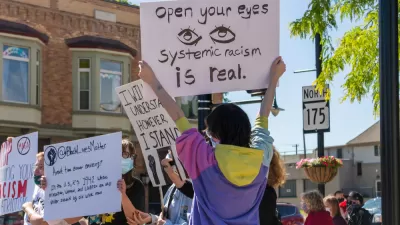On a holiday that commemorates the end of slavery in the United States, the White House marked the occasion by discussion exclusionary zoning.

In a remarkable moment that reveals how far the historical understanding of racism has come in recent years, an article on WhiteHouse.gov commemorates Juneteenth by examining the racial discrimination effect of exclusionary zoning.
Juneteenth, as explained in the article, marks the day a Major General of the Union Army arrived in Galveston, Texas to enforce the Emancipation Proclamation, and free the last enslaved Black people in Texas from bondage.
Given the historic significance of the date, and its increasing relevance as race continues to take central stage in the culture war, it might come as a surprise that zoning is on the mind of the Biden administration. The confrontation with the racism of the country in news media and politics at every level of government in recent years has include an account of the past discrimination and racism of planning policies.
While a nascent effort to undo some of the racist policies of the past is underway in some cities and states, much of which has focused on the exclusionary effects of single-family zoning, the idea zoning reform as a tool for equity is still relatively new in the halls of the federal government. The Biden administration has taken the cause of zoning reform to new levels of visibility by proposing a competitive grant program that would encourage cities to begin to dismantle the tools of exclusionary zoning. The Unlocking Possibilities Program would provide $5 billion in competitive grants as an incentivize for zoning reforms. (The Biden administration's Unlocking Possibilities Program closely follows the Housing Supply and Affordability Act proposed by Senator Amy Klobuchar (D-Minnesota), Senator Tim Kaine (D-Virginia), and Senator Rob Portman (R-Ohio) in March 2021.")
So, the White House Juneteenth article lays out the case for the program and for the movement.
"[I]t is imperative to not lose sight of the fact that we still have much work to do to address the vestiges of slavery and historic discrimination," reads the article. Exclusionary zoning, according to the article, is one of those policies and practices in existence today "that are seemingly non-discriminatory on their face but still negatively affect many families of color, especially Black families."
The article provides a history, full of links to research sources, about the evolution of exclusionary zoning as a tool of racism and discrimination.
FULL STORY: Exclusionary Zoning: Its Effect on Racial Discrimination in the Housing Market

Planetizen Federal Action Tracker
A weekly monitor of how Trump’s orders and actions are impacting planners and planning in America.

Restaurant Patios Were a Pandemic Win — Why Were They so Hard to Keep?
Social distancing requirements and changes in travel patterns prompted cities to pilot new uses for street and sidewalk space. Then it got complicated.

Maui's Vacation Rental Debate Turns Ugly
Verbal attacks, misinformation campaigns and fistfights plague a high-stakes debate to convert thousands of vacation rentals into long-term housing.

Boulder Eliminates Parking Minimums Citywide
Officials estimate the cost of building a single underground parking space at up to $100,000.

Orange County, Florida Adopts Largest US “Sprawl Repair” Code
The ‘Orange Code’ seeks to rectify decades of sprawl-inducing, car-oriented development.

Maui's Vacation Rental Debate Turns Ugly
Verbal attacks, misinformation campaigns and fistfights plague a high-stakes debate to convert thousands of vacation rentals into long-term housing.
Urban Design for Planners 1: Software Tools
This six-course series explores essential urban design concepts using open source software and equips planners with the tools they need to participate fully in the urban design process.
Planning for Universal Design
Learn the tools for implementing Universal Design in planning regulations.
Heyer Gruel & Associates PA
JM Goldson LLC
Custer County Colorado
City of Camden Redevelopment Agency
City of Astoria
Transportation Research & Education Center (TREC) at Portland State University
Camden Redevelopment Agency
City of Claremont
Municipality of Princeton (NJ)





























